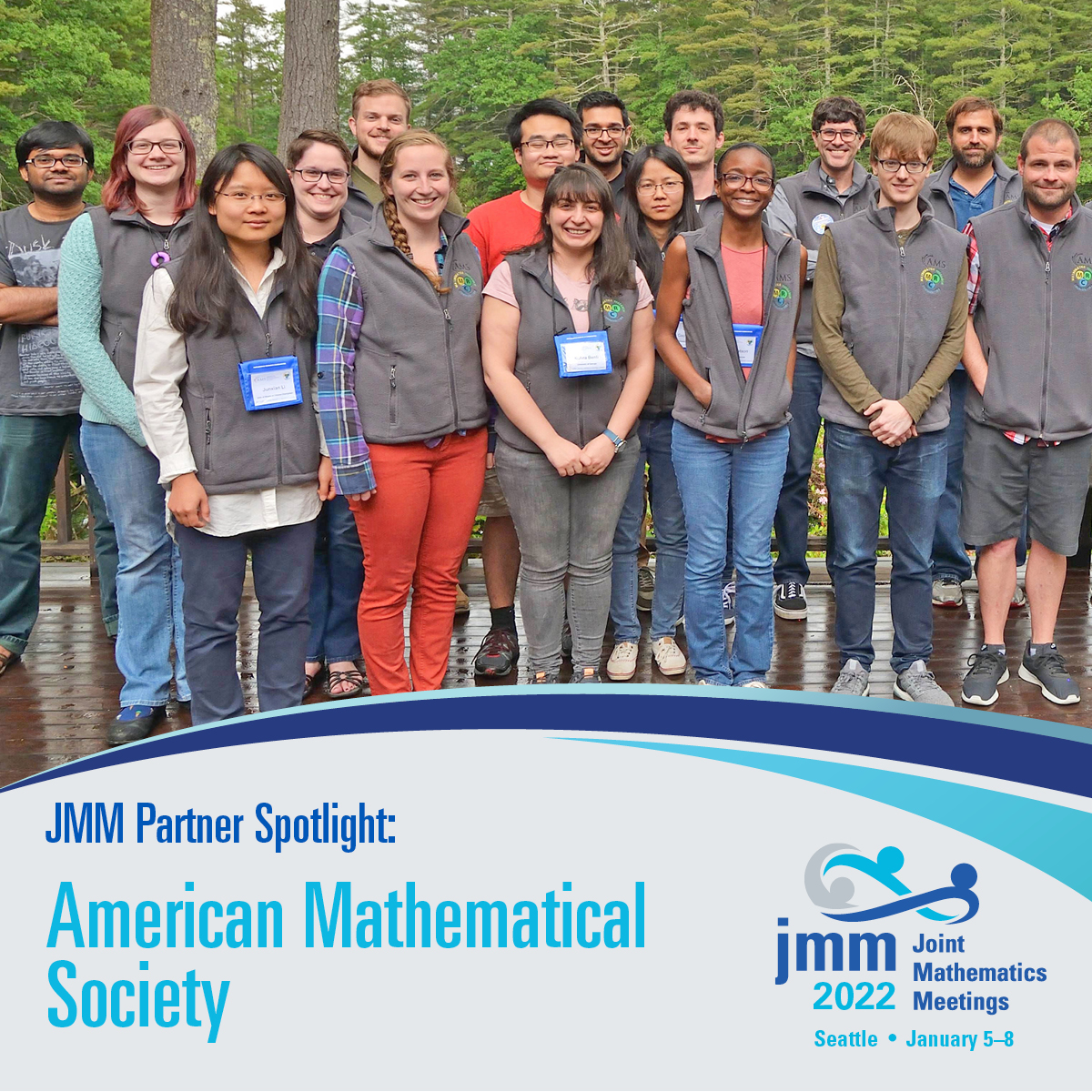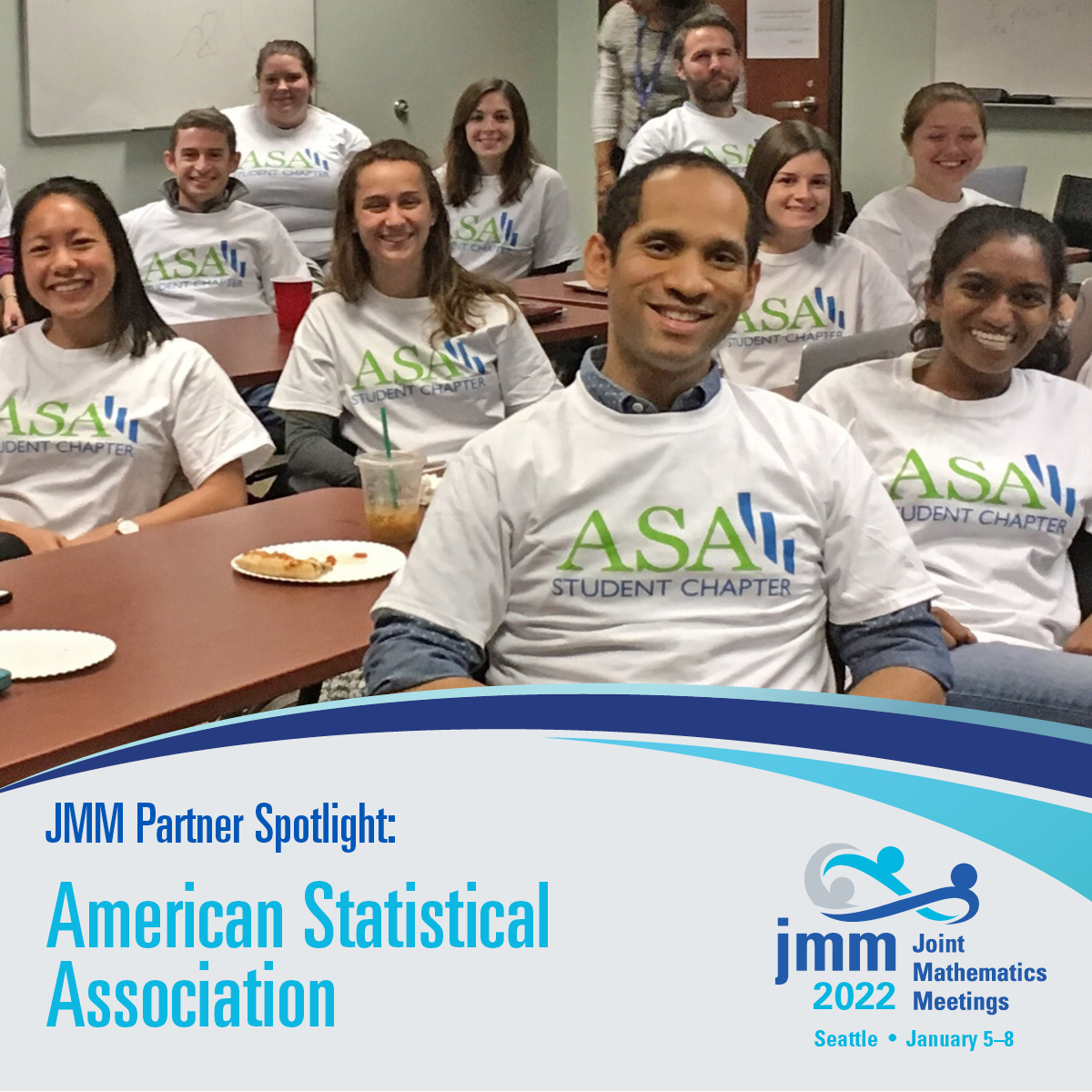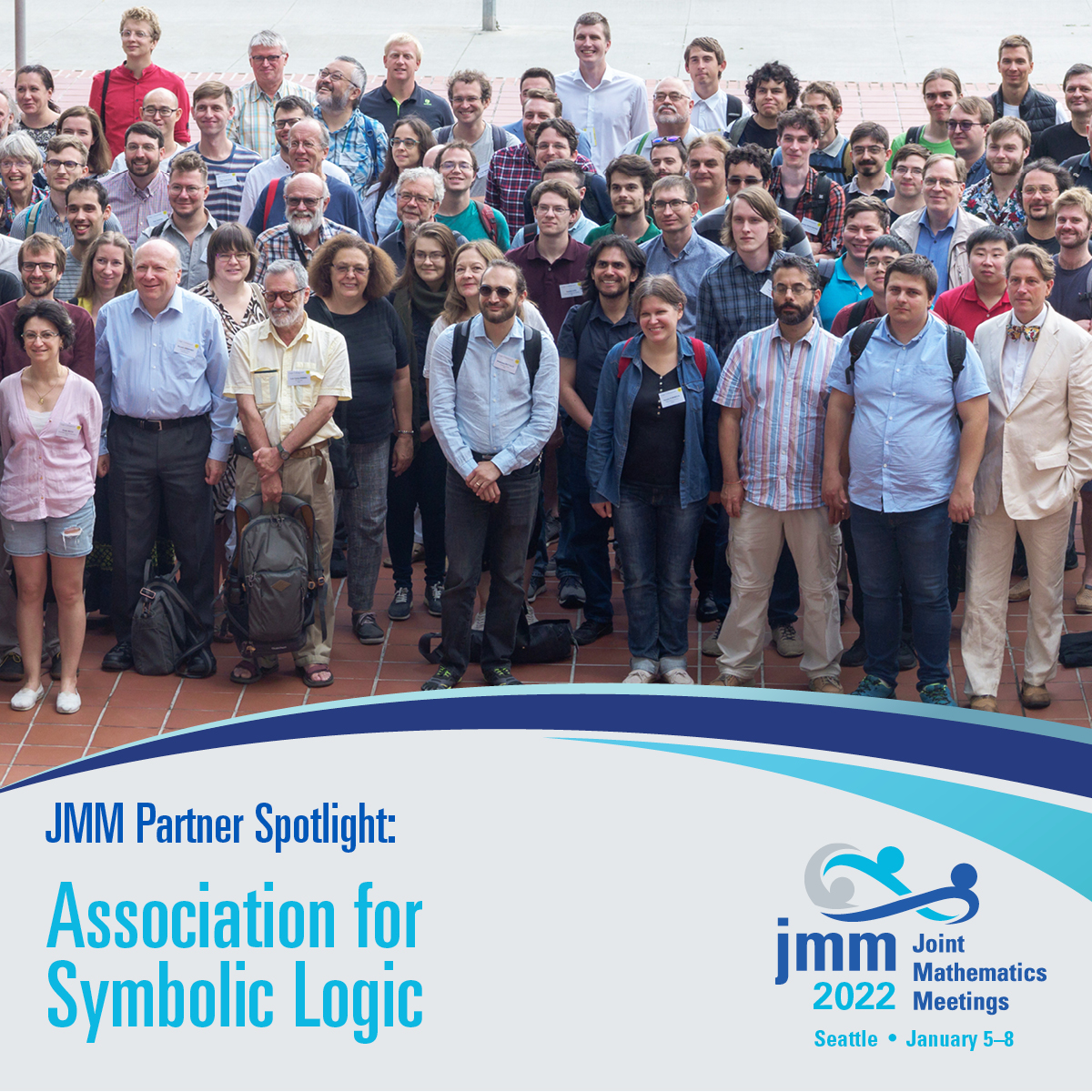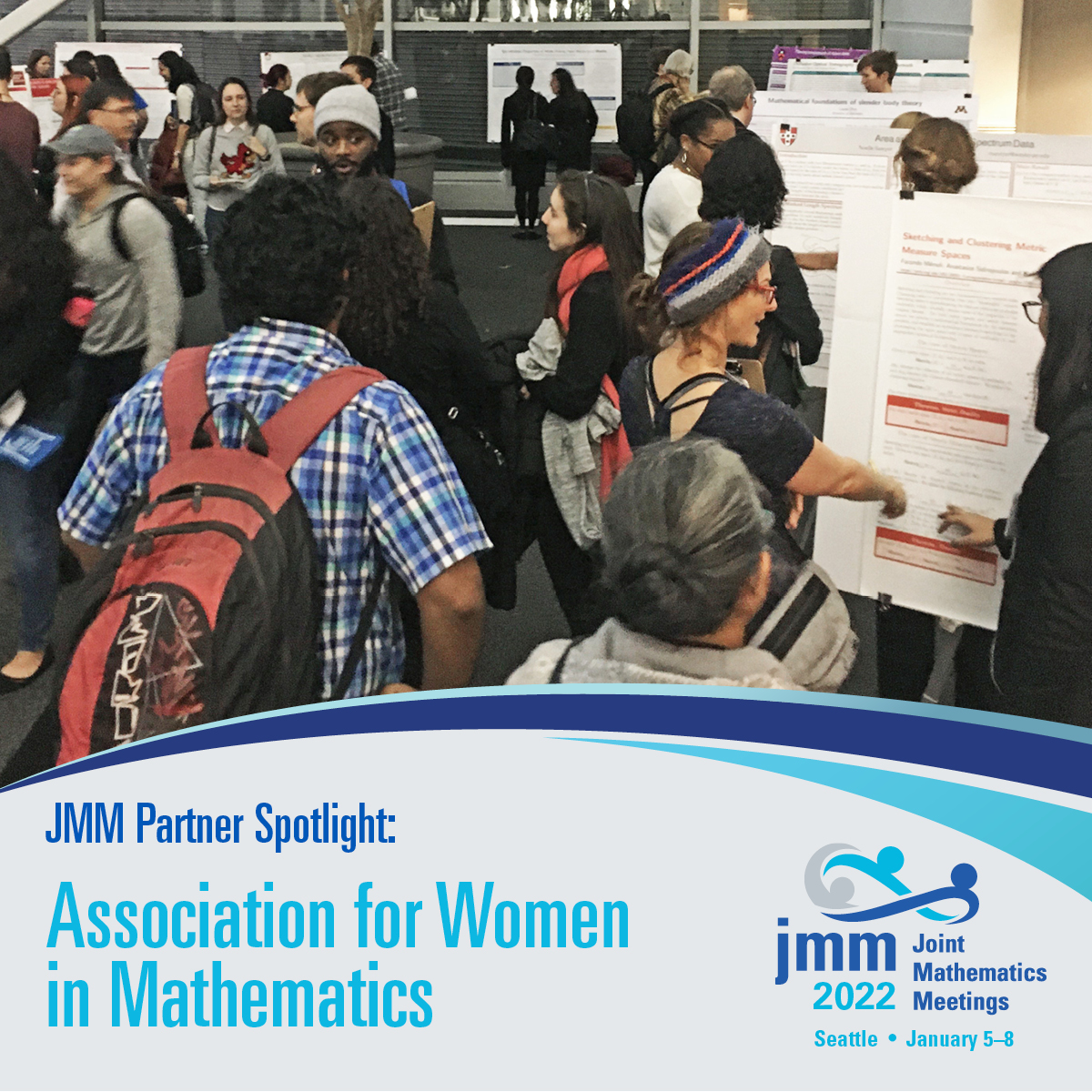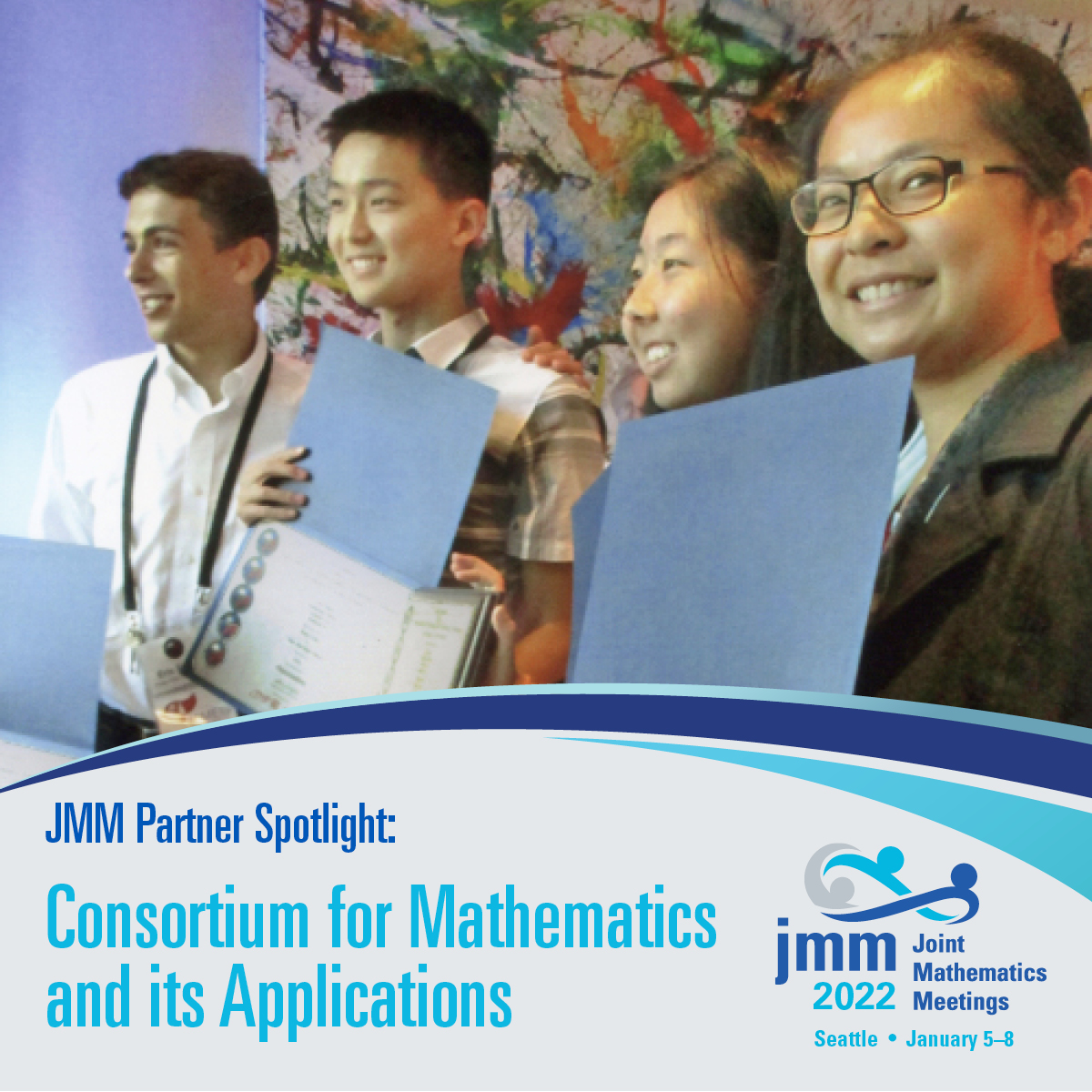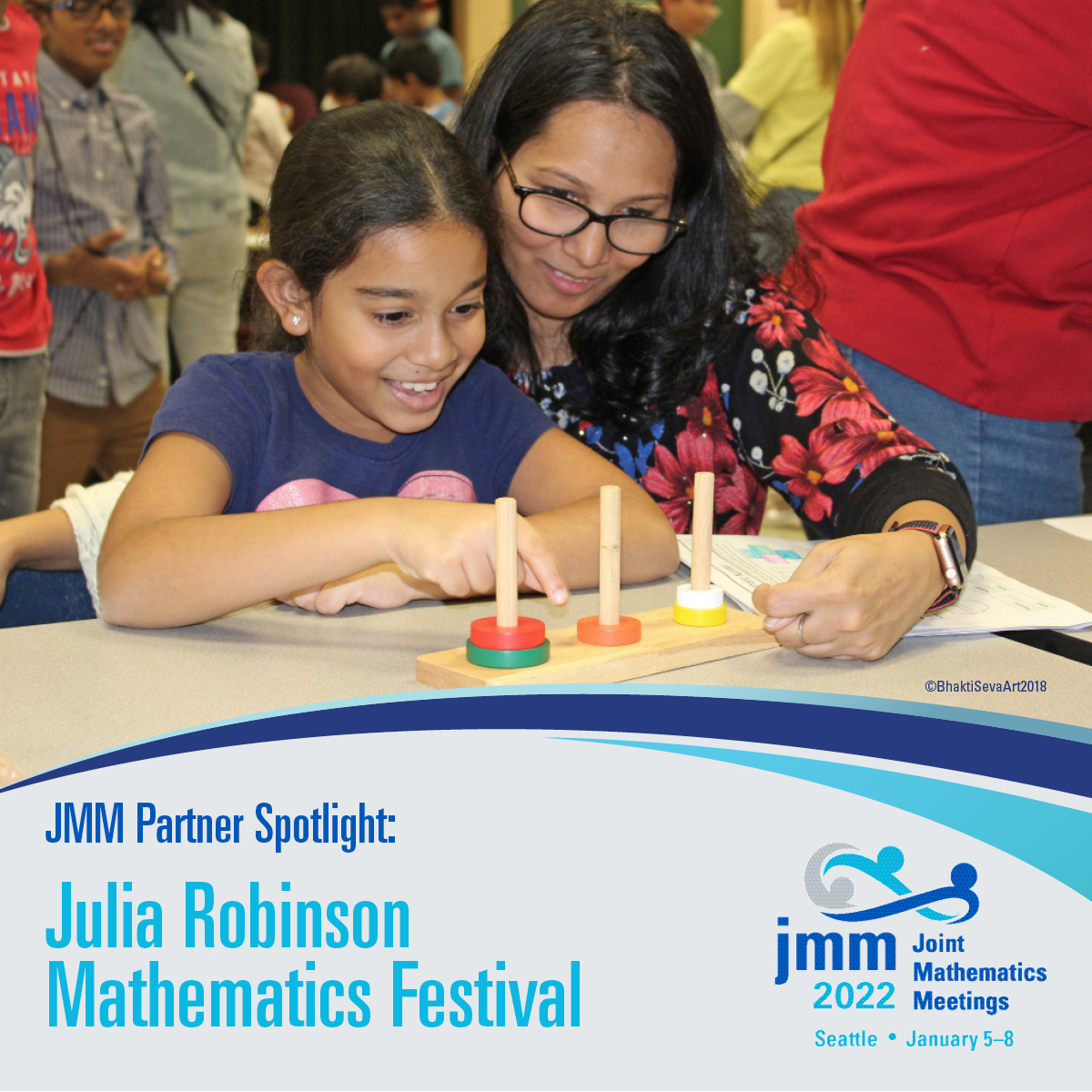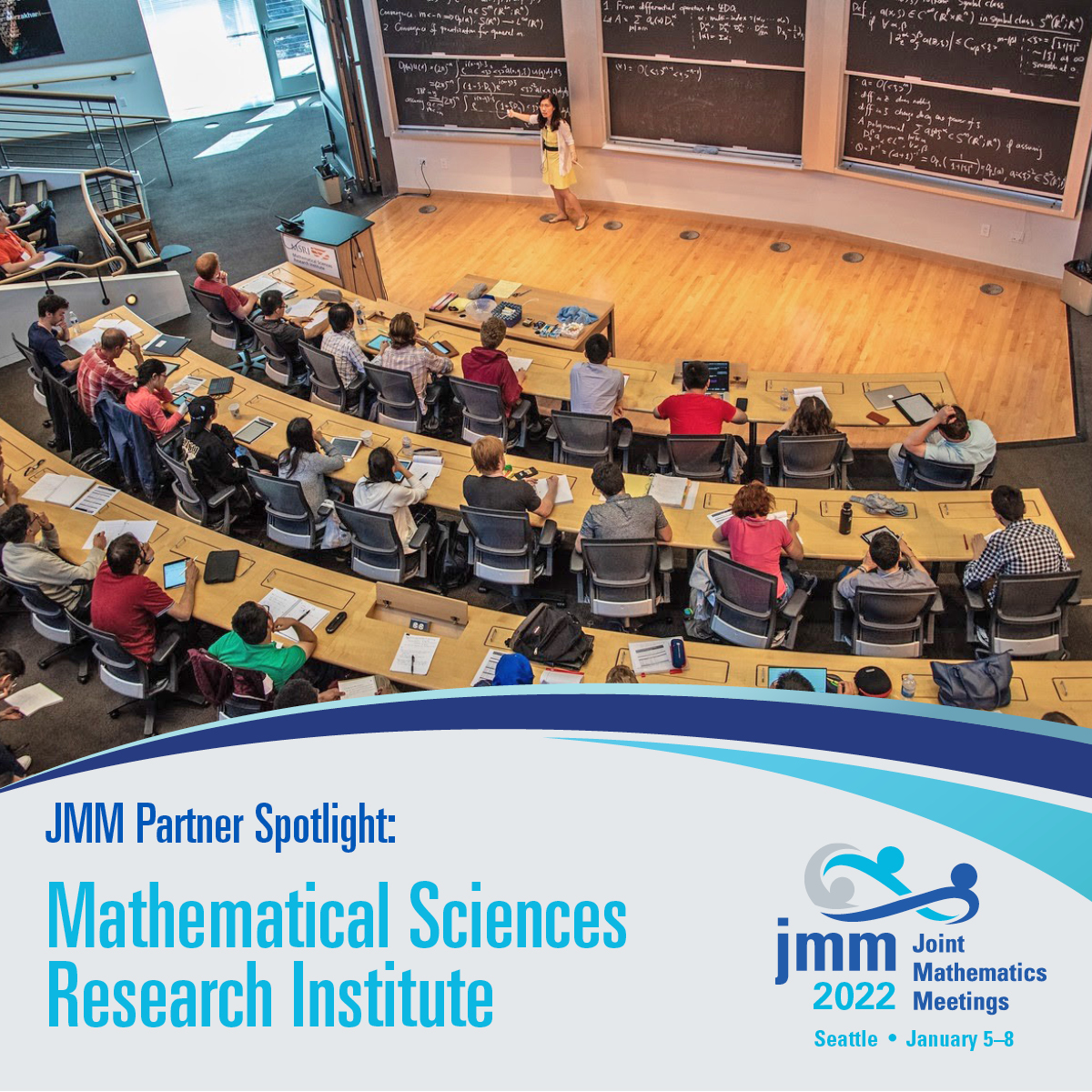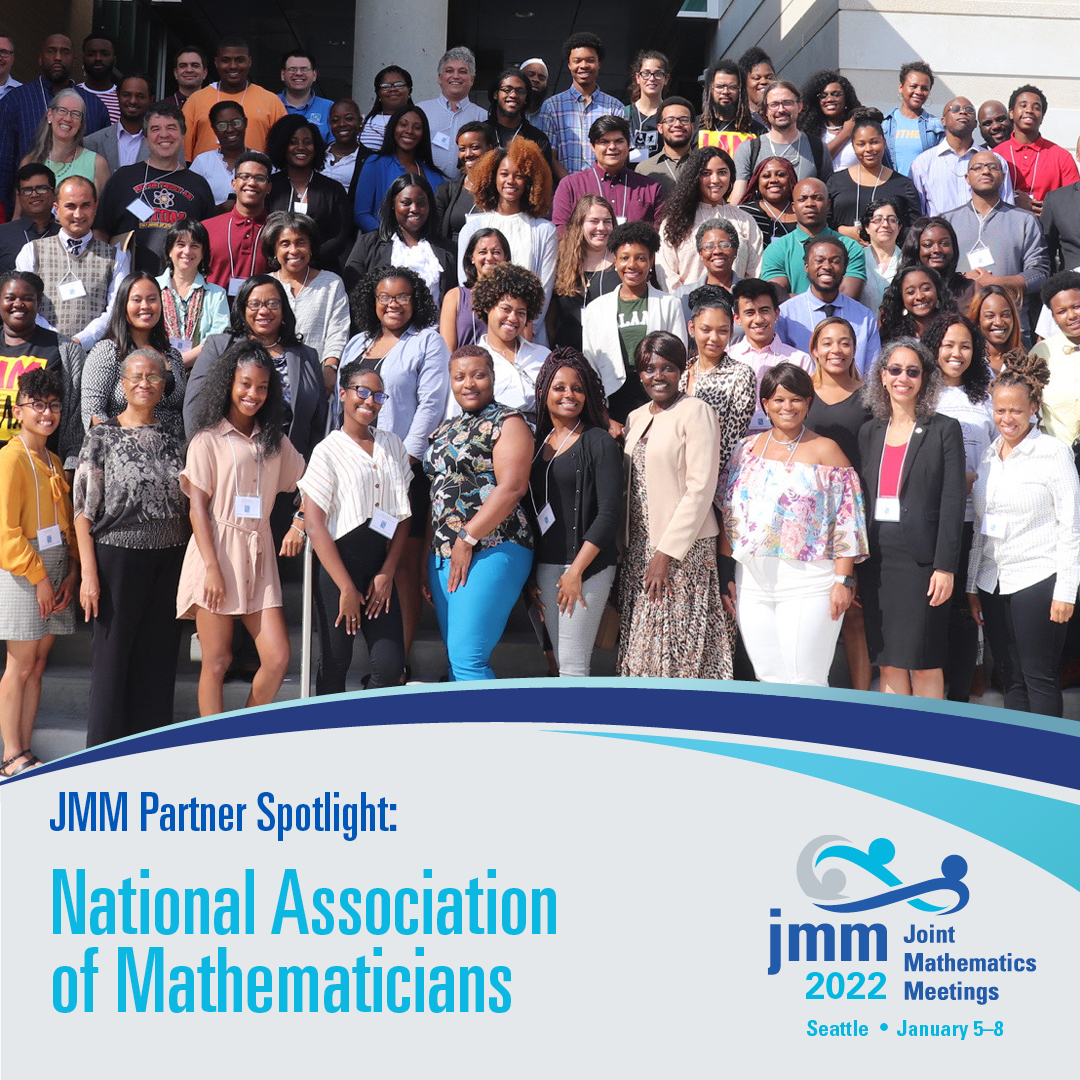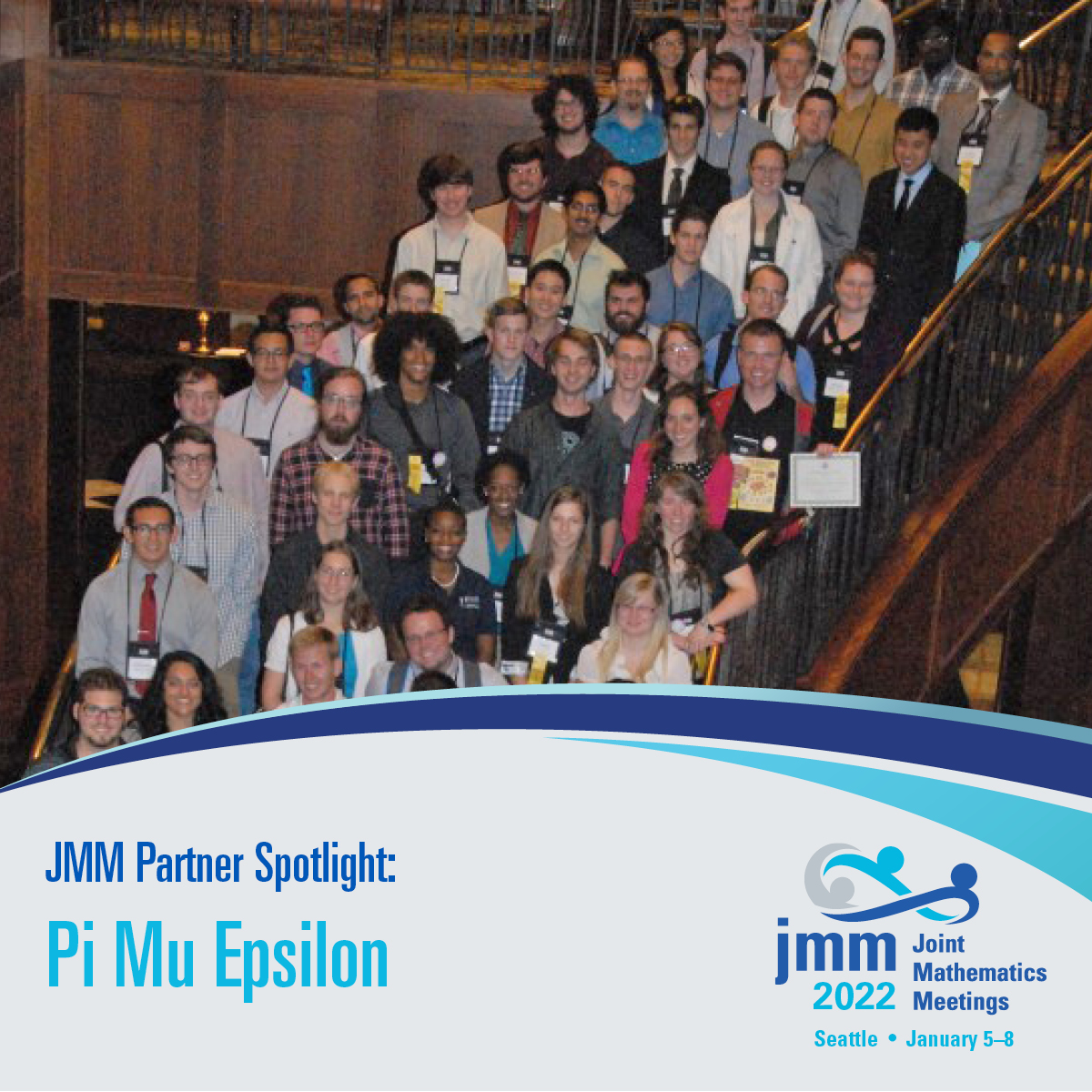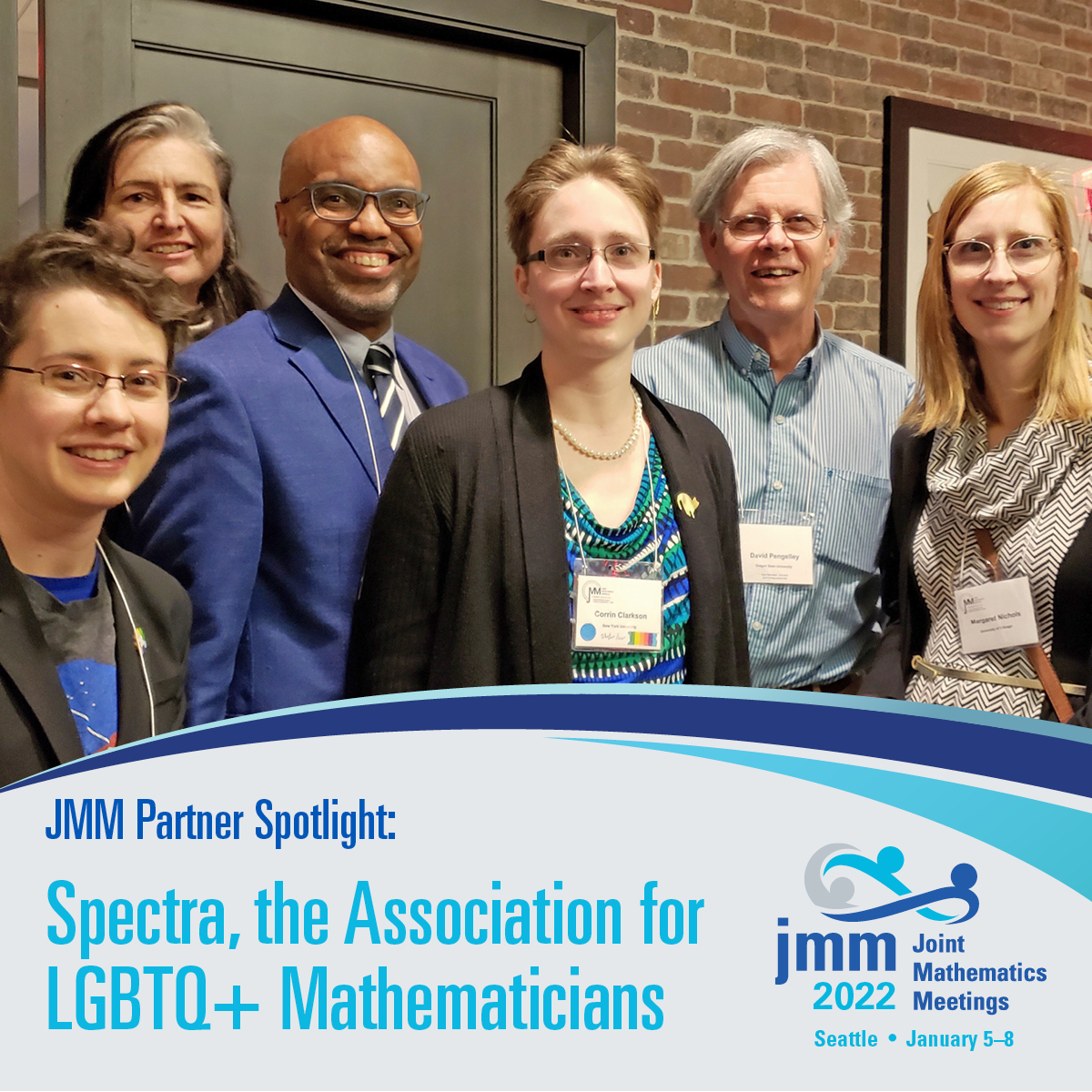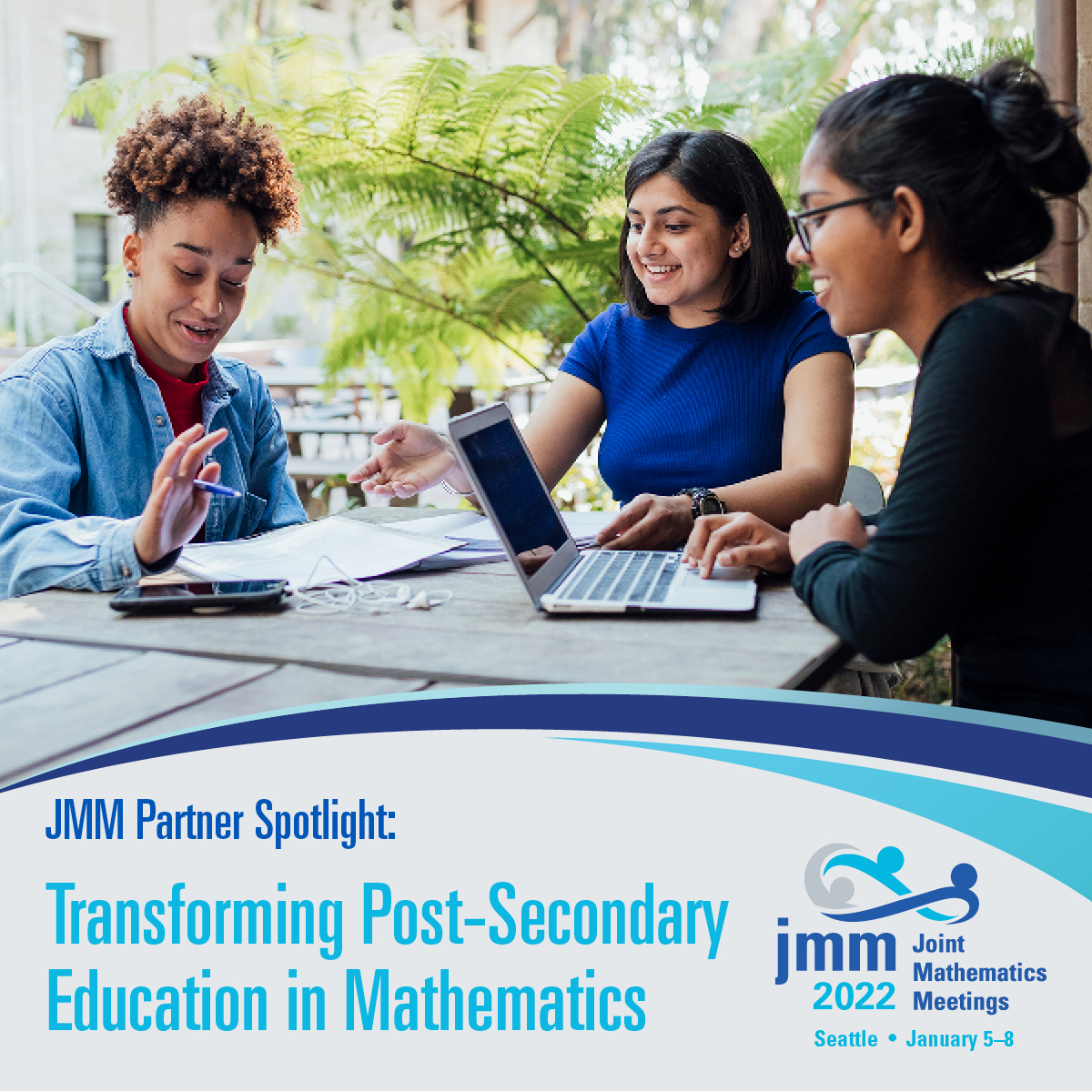JMM Partner Spotlights
2022 marks the first year of the reimagined Joint Mathematics Meetings, with more than a dozen mathematics organizations partnering to create a program that offers something for everyone. Explore the diverse organizations coming together for the largest annual mathematics gathering in the world, and learn more about their programming for JMM 2022.
American Mathematical Society
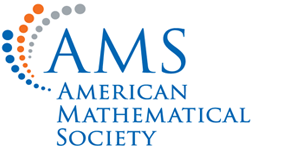 Founded in 1888, the American Mathematical Society (AMS) is dedicated to advancing research and connecting the diverse global mathematical community. The AMS counts some 30,000 individual members worldwide in all professions in the mathematical sciences and all stages of their careers, plus 570 institutional members.
Founded in 1888, the American Mathematical Society (AMS) is dedicated to advancing research and connecting the diverse global mathematical community. The AMS counts some 30,000 individual members worldwide in all professions in the mathematical sciences and all stages of their careers, plus 570 institutional members.
American Statistical Association
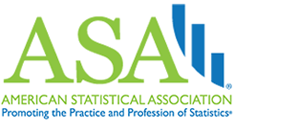 Founded in 1839, the American Statistical Association (ASA) is the world’s largest community of statisticians, with more than 19,000 members in academia, industry, and government worldwide. Its vision is a world that relies on data and statistical thinking to drive discovery and inform decisions.
Founded in 1839, the American Statistical Association (ASA) is the world’s largest community of statisticians, with more than 19,000 members in academia, industry, and government worldwide. Its vision is a world that relies on data and statistical thinking to drive discovery and inform decisions.
Association for Symbolic Logic
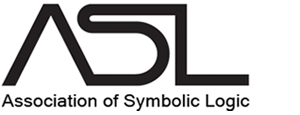 An international organization founded in 1936, the Association for Symbolic Logic (ASL) provides a forum for the presentation, publication, and critical discussion of scholarly work across the entire field of logical inquiry. Its members include logicians based in departments of mathematics, philosophy, and computer science.
An international organization founded in 1936, the Association for Symbolic Logic (ASL) provides a forum for the presentation, publication, and critical discussion of scholarly work across the entire field of logical inquiry. Its members include logicians based in departments of mathematics, philosophy, and computer science.
Association for Women in Mathematics
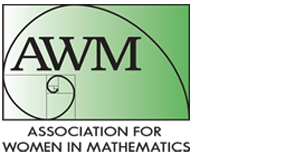 Currently celebrating its 50-year anniversary, the Association for Women in Mathematics (AWM) has played a critical role in increasing the presence and visibility of women in the mathematical sciences. The organization now counts more than 3,500 members from the U.S. and around the world.
Currently celebrating its 50-year anniversary, the Association for Women in Mathematics (AWM) has played a critical role in increasing the presence and visibility of women in the mathematical sciences. The organization now counts more than 3,500 members from the U.S. and around the world.
Consortium for Mathematics and Its Applications
 With a focus on mathematical modeling, the Consortium for Mathematics and Its Applications (COMAP) strives to improve mathematics education at all levels. COMAP offers curriculum materials and professional development for teachers, conducts research on mathematics education, and runs contests in mathematical modeling.
With a focus on mathematical modeling, the Consortium for Mathematics and Its Applications (COMAP) strives to improve mathematics education at all levels. COMAP offers curriculum materials and professional development for teachers, conducts research on mathematics education, and runs contests in mathematical modeling.
International Linear Algebra Society
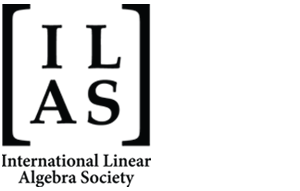 The International Linear Algebra Society (ILAS) is an international organization that strives to highlight the beauty of research in linear algebra and its wide range of applications. Among its activities, ILAS publishes the Electronic Journal of Linear Algebra, awards internationally recognized prizes to linear algebra researchers, and organizes conferences across the world.
The International Linear Algebra Society (ILAS) is an international organization that strives to highlight the beauty of research in linear algebra and its wide range of applications. Among its activities, ILAS publishes the Electronic Journal of Linear Algebra, awards internationally recognized prizes to linear algebra researchers, and organizes conferences across the world.
Julia Robinson Mathematics Festival
 Named for esteemed mathematician Julia Robinson, who made crucial contributions to solving Hilbert’s tenth problem, the Julia Robinson Mathematics Festival (JRMF) seeks to inspire joy in mathematics through collaboration, exploration, and discovery. Since 2007, it has supported local hosts in organizing events in 26 states and 17 countries.
Named for esteemed mathematician Julia Robinson, who made crucial contributions to solving Hilbert’s tenth problem, the Julia Robinson Mathematics Festival (JRMF) seeks to inspire joy in mathematics through collaboration, exploration, and discovery. Since 2007, it has supported local hosts in organizing events in 26 states and 17 countries.
Mathematical Sciences Research Institute
 Located in Berkeley, California, the Mathematical Sciences Research Institute (MSRI) is one of the world’s preeminent centers for collaborative research. It hosts about 2,000 mathematical scientists each year to advance fundamental knowledge and train the next generation of researchers.
Located in Berkeley, California, the Mathematical Sciences Research Institute (MSRI) is one of the world’s preeminent centers for collaborative research. It hosts about 2,000 mathematical scientists each year to advance fundamental knowledge and train the next generation of researchers.
National Association of Mathematicians
 Since its inception in 1969, the National Association of Mathematicians (NAM) has promoted excellence in the mathematical sciences. While membership is open to everyone, NAM seeks to advance the mathematical development of all underrepresented American minorities in general and African Americans in particular.
Since its inception in 1969, the National Association of Mathematicians (NAM) has promoted excellence in the mathematical sciences. While membership is open to everyone, NAM seeks to advance the mathematical development of all underrepresented American minorities in general and African Americans in particular.
Pi Mu Epsilon
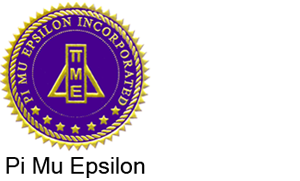 The U.S. national mathematics honor society, Pi Mu Epsilon (PME) has chapters at more than 400 colleges and universities. It promotes mathematical scholarship among undergraduates by awarding grants to support enrichment activities, publishing the work of its members, and funding students’ conference travel.
The U.S. national mathematics honor society, Pi Mu Epsilon (PME) has chapters at more than 400 colleges and universities. It promotes mathematical scholarship among undergraduates by awarding grants to support enrichment activities, publishing the work of its members, and funding students’ conference travel.
Society for Industrial and Applied Mathematics
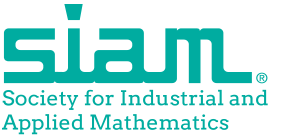 The Society for Industrial and Applied Mathematics (SIAM) advances the application of mathematics and computational science to engineering, industry, science, and society. With more than 14,000 individual members and 500 institutional members, SIAM’s community includes activity groups, student chapters, and geographic sections.
The Society for Industrial and Applied Mathematics (SIAM) advances the application of mathematics and computational science to engineering, industry, science, and society. With more than 14,000 individual members and 500 institutional members, SIAM’s community includes activity groups, student chapters, and geographic sections.
Spectra, the Association for LGBTQ+ Mathematicians
 Spectra, the Association for LGBTQ+ Mathematicians, seeks to provide community and to advocate for gender and sexual minority mathematicians. For example, it has recently been pushing for more trans-inclusive naming practices in mathematics and beyond. Spectra held its first official conference in August.
Spectra, the Association for LGBTQ+ Mathematicians, seeks to provide community and to advocate for gender and sexual minority mathematicians. For example, it has recently been pushing for more trans-inclusive naming practices in mathematics and beyond. Spectra held its first official conference in August.
Transforming Post-Secondary Education in Mathematics
 Transforming Post-Secondary Education in Mathematics (TPSE Math) pursues mathematically rich and relevant education for all students, regardless of their field of study. It aims to enable all students to develop the mathematical knowledge and skills necessary for productive engagement in society and in the workplace.
Transforming Post-Secondary Education in Mathematics (TPSE Math) pursues mathematically rich and relevant education for all students, regardless of their field of study. It aims to enable all students to develop the mathematical knowledge and skills necessary for productive engagement in society and in the workplace.
- JMM Home
- Access to Virtual Platform
- General Instructions
- Policies and Statements
- General
- Broadcasting and Photographing
- MathSafe
- Scientific Program
- Virtual Program
- Index of Programs by Organization
- Invited Speakers - A Closer Look
- Timetable
- Child Care
- Child Care Grants
- Exhibits
- Exhibitor Spotlights
- Mathematical Art Exhibition
- Additional Exhibitor Events and Activities
- Prizes and Awards
- Prizes and Awards
- Professional Development
- AMS Short Course
- Dept Chairs Workshop
- PEPs
- Registration
- How to Register
- Registration Fees
- Frequently Asked Questions
- General
-
- Social Networking

